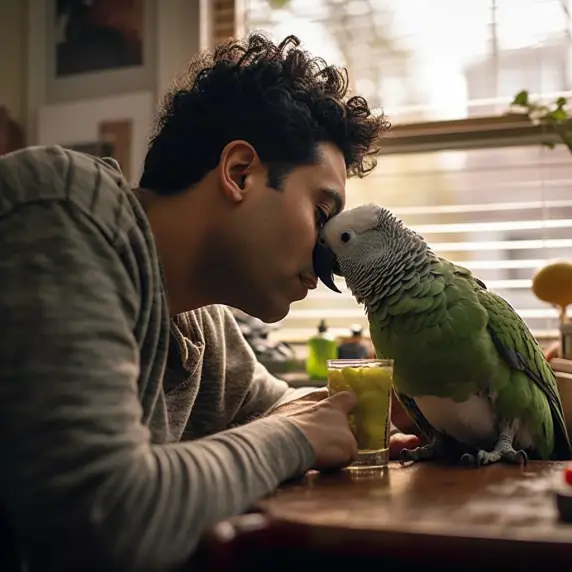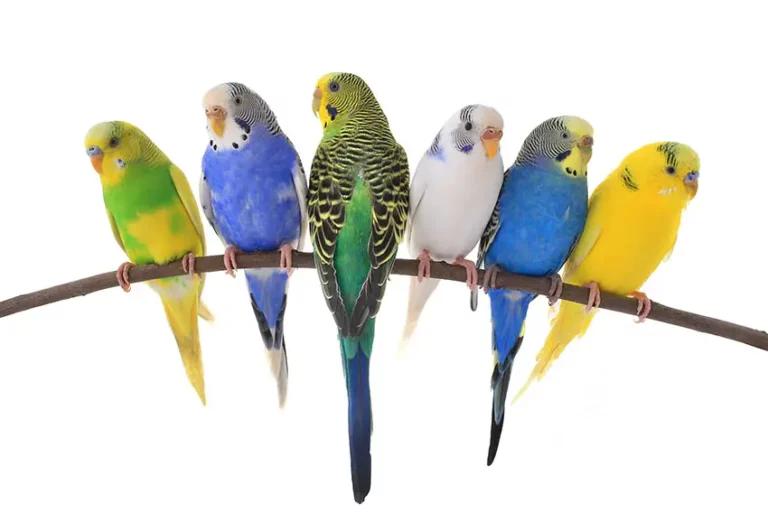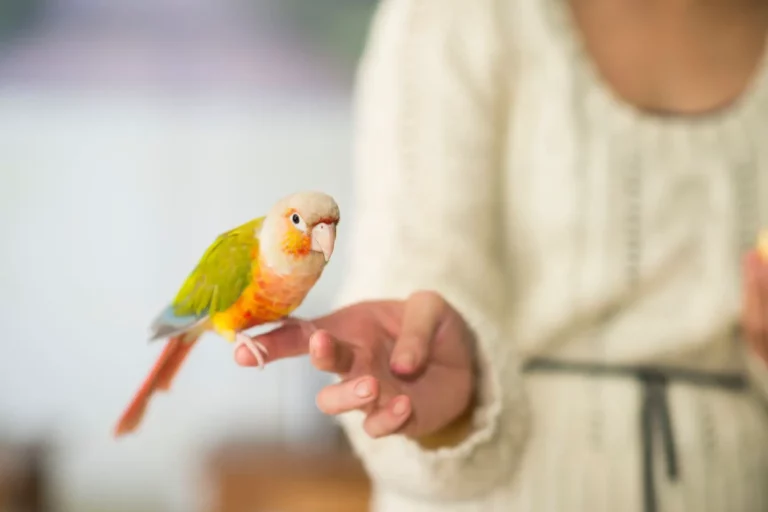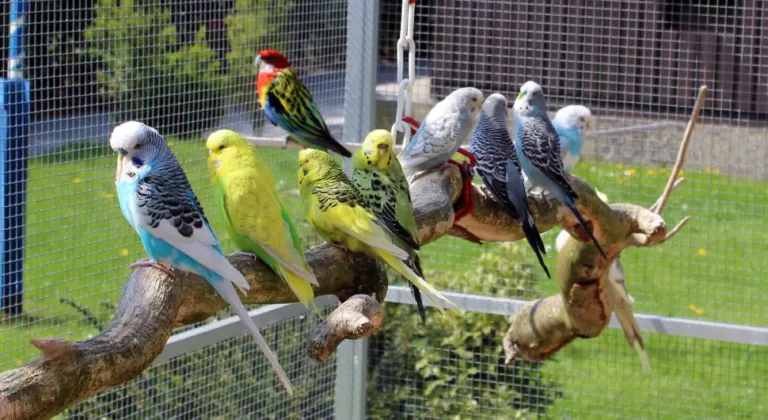10 Small Pet Bird Breeds Perfect for Apartment Living
Are you considering adding a feathered friend to your apartment life but unsure of which breed would be the best fit? Choosing the perfect small pet bird can be a challenging yet exciting process.
This blog post will provide you with valuable insights into the top 10 small pet bird breeds that thrive in apartment settings.
We’ll guide you through the factors to consider when selecting a bird, along with detailed information on each breed’s personality, care needs, and space requirements.
So, let’s embark on this journey to find your perfect avian companion!
Title
Budgerigars: Small, social, quiet.
Canaries: Singing, low maintenance.
Lovebirds: Small, affectionate, quiet.
Finches: Social, active, need companions.
Parrotlets: Miniature, intelligent, quiet.
Cockatiels: Quiet, affectionate, distinctive crest.
Pionus Parrots: Quiet, easy to handle.
Quaker Parrots: Social, intelligent, moderately loud.
Dwarf Parrots: Small, suitable size, can be noisy.
Doves: Quiet, gentle, easy care.
Top 10 Small Pet Bird Breeds for Apartment Living
1. Parakeets (Budgies)
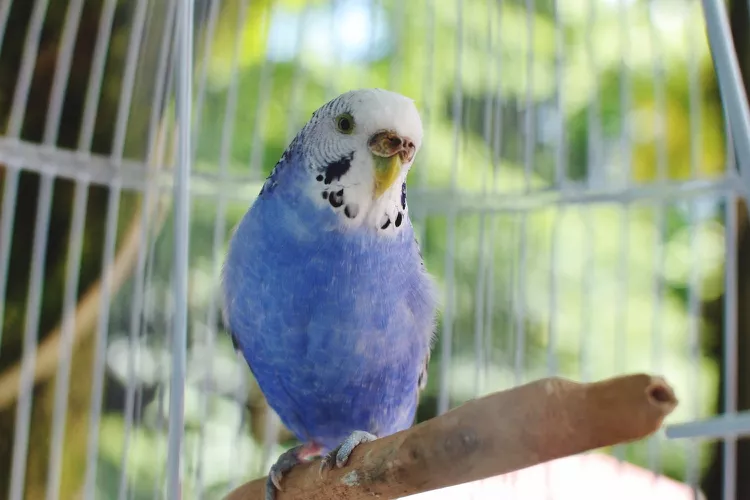
Parakeets are friendly, intelligent, and easy to train, making them excellent apartment pets. They enjoy socializing with their owners and can even learn to mimic sounds and words. Their care requirements include a balanced diet of seeds, pellets, and fresh fruits and vegetables.
While they can be a bit chatty, parakeets are generally not too loud. A medium-sized cage with plenty of perches and toys is ideal for keeping them active and happy.
2. Cockatiels
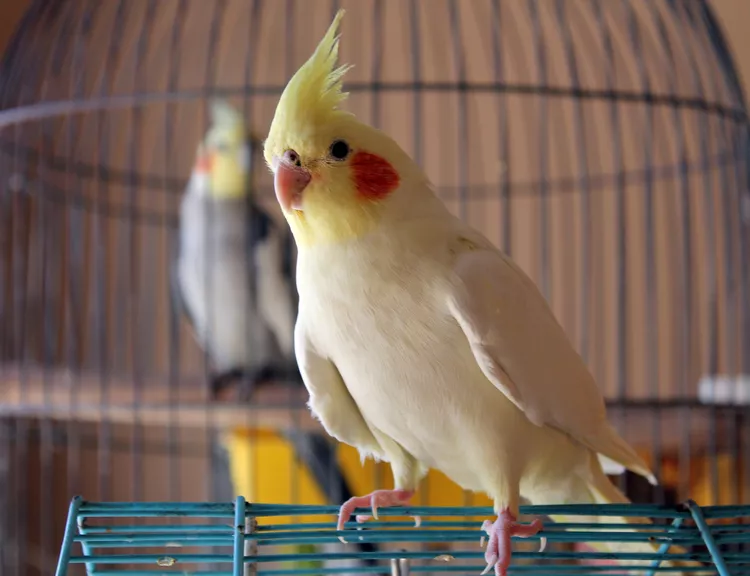
Cockatiels are affectionate, gentle, and sociable birds. They love interacting with their owners and can learn to whistle tunes. Their diet should consist of pellets, seeds, and a variety of fresh fruits and vegetables.
Cockatiels are relatively quiet birds, especially when compared to larger parrot species. A spacious cage with ample room to climb and explore is essential for their well-being.
3. Lovebirds

Lovebirds are playful, energetic, and affectionate. They form strong bonds with their owners, making them excellent companions. A balanced diet of pellets, seeds, and fresh produce is essential for their health.
Lovebirds can be moderately noisy, but their small size makes them a suitable choice for apartments. A roomy cage with ample toys and perches is necessary to keep them entertained.
4. Finch species
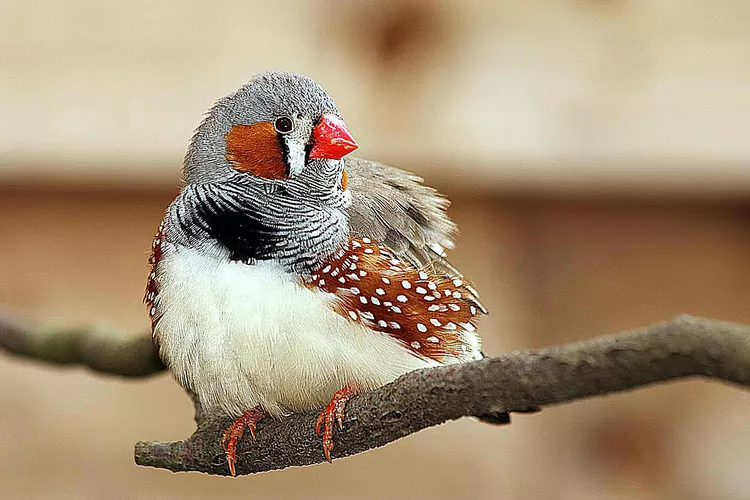
Finches are small, active birds that prefer to live in pairs or small groups. They are low-maintenance, as they don’t require much handling and are content with watching their surroundings. Offer them a diet of seeds, greens, and fresh fruits.
Finches produce minimal noise and are perfect for apartments. A spacious cage with horizontal bars for perching and hopping is ideal.
5. Parrotlets
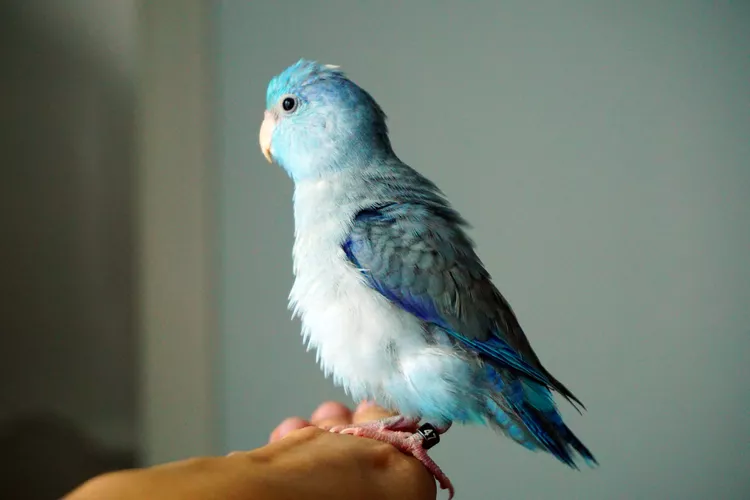
Parrotlets are bold, curious, and intelligent birds that form strong bonds with their owners. They require a diet of pellets, seeds, and fresh fruits and vegetables.
Although small, parrotlets can be vocal. However, their size and sound level are suitable for apartment living. Provide a medium-sized cage with various toys and perches to keep them engaged.
6. Canary varieties
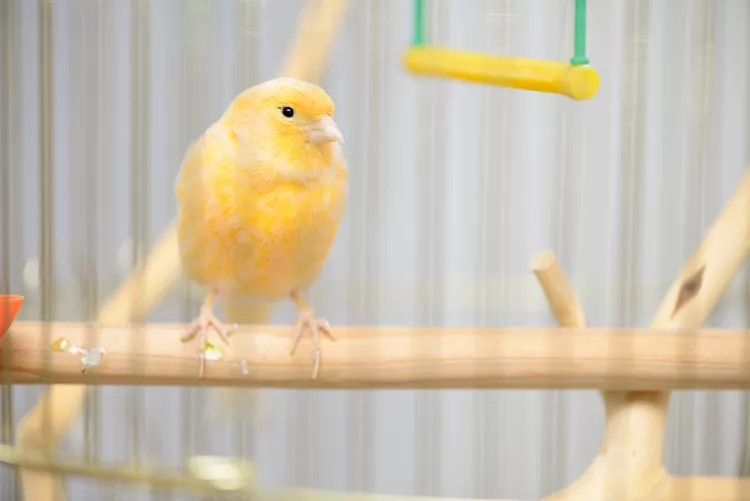
Canaries are known for their beautiful songs and bright colors. They are low-maintenance, as they don’t need much handling, but they do require a diet of seeds, fresh produce, and egg-based foods.
Canaries are ideal for apartment living due to their relatively quiet nature. A roomy cage with several perches at varying heights is necessary to accommodate their love for flying.
7. Poicephalus parrots
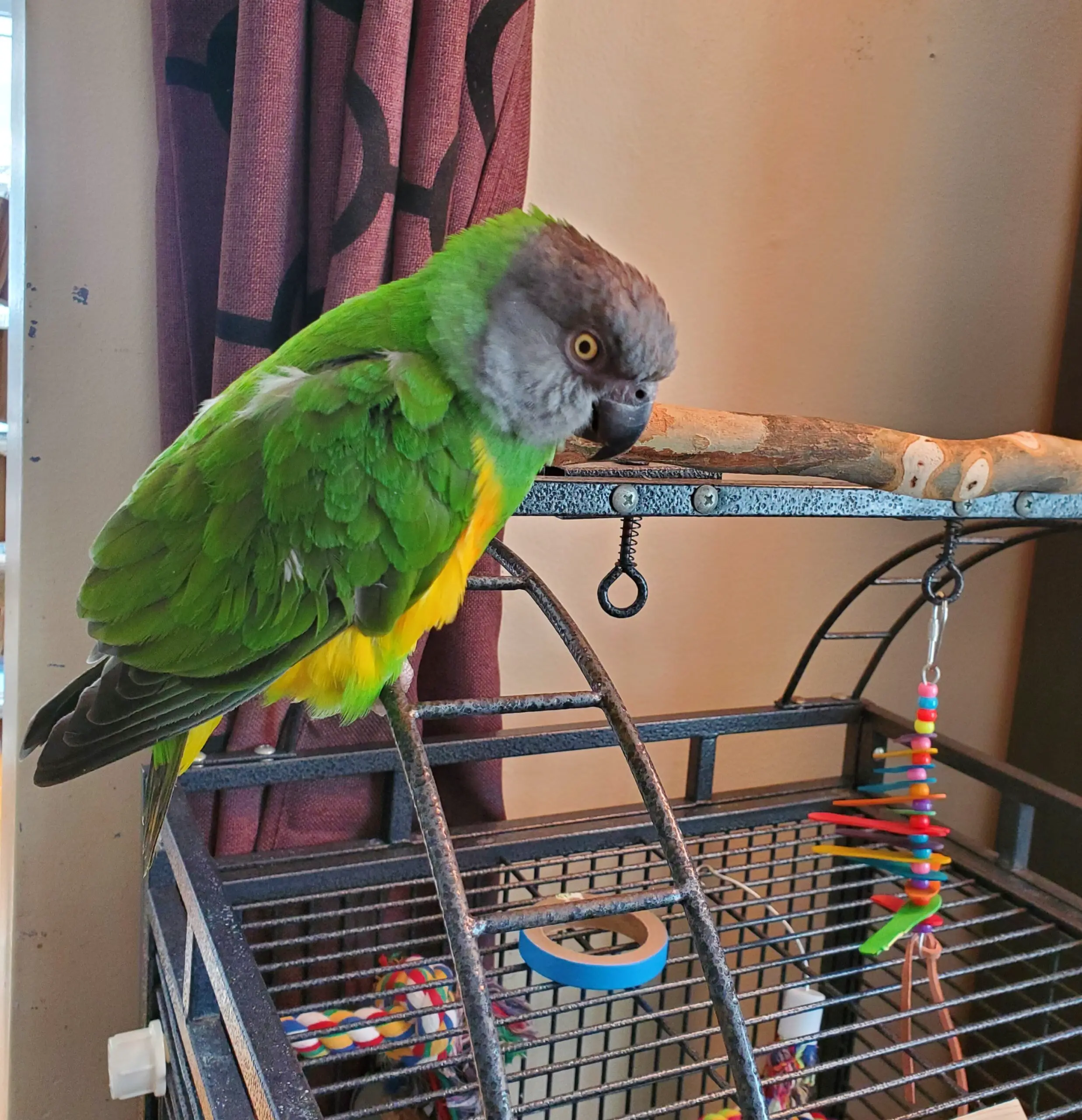
Poicephalus parrots, such as Senegal Parrots and Meyer’s Parrots, are intelligent, affectionate, and easily trainable. They require a diet of pellets, seeds, and fresh fruits and vegetables.
Poicephalus parrots are generally quieter than other parrot species, making them a suitable choice for apartments. A spacious cage with numerous perches and toys is necessary for their well-being.
8. Bourke’s Parakeets
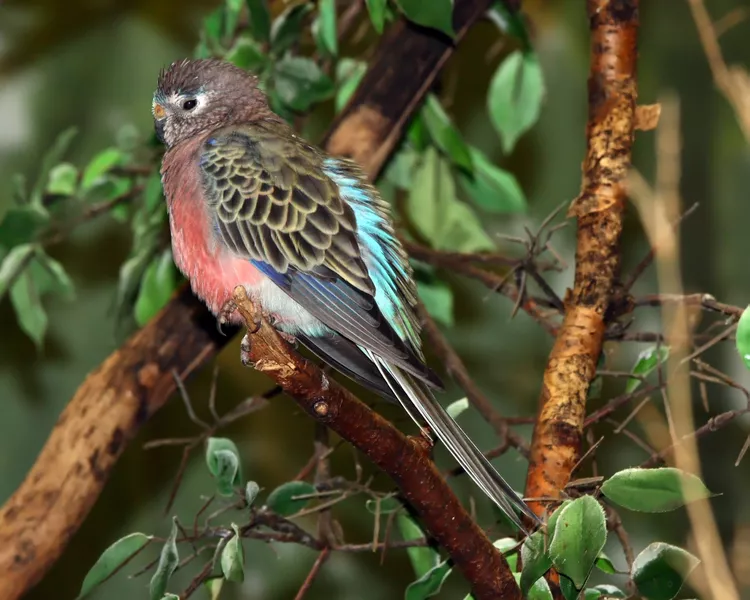
Bourke’s Parakeets are gentle, calm, and friendly birds that enjoy observing their surroundings. They require a balanced diet of seeds, pellets, and fresh fruits and vegetables.
Bourke’s Parakeets are relatively quiet, making them perfect for apartment living. A medium-sized cage with plenty of perches and toys will help keep them content and active.
9. Quaker parrots
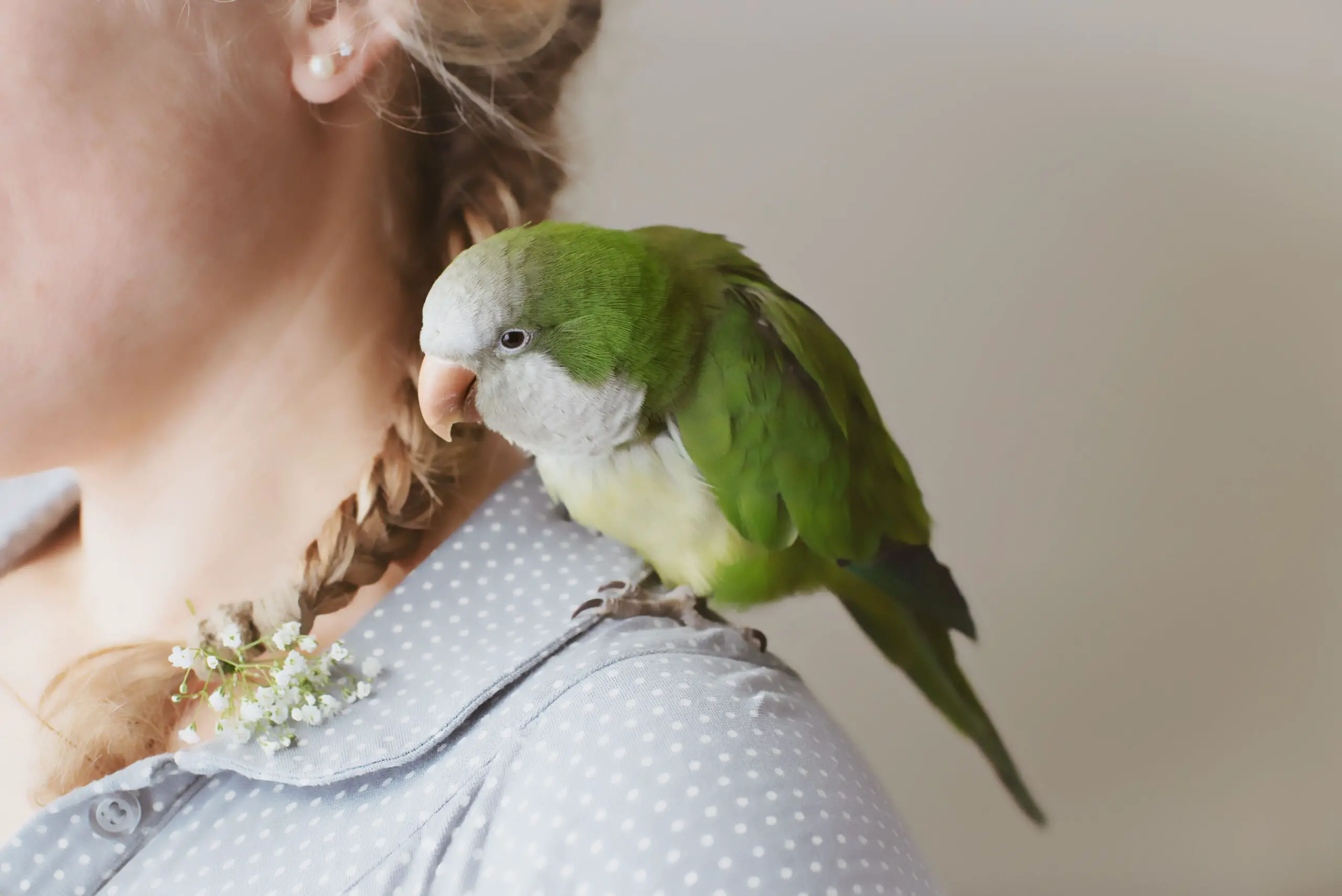
Quaker parrots, also known as Monk Parakeets, are intelligent, affectionate, and highly trainable. They enjoy interacting with their owners and can learn to mimic words and sounds. Their diet should include pellets, seeds, and a variety of fresh fruits and vegetables.
Quaker parrots can be moderately noisy, but their small size makes them a suitable choice for apartments. Provide them with a roomy cage, ample toys, and perches to keep them entertained and happy.
10. Diamond doves
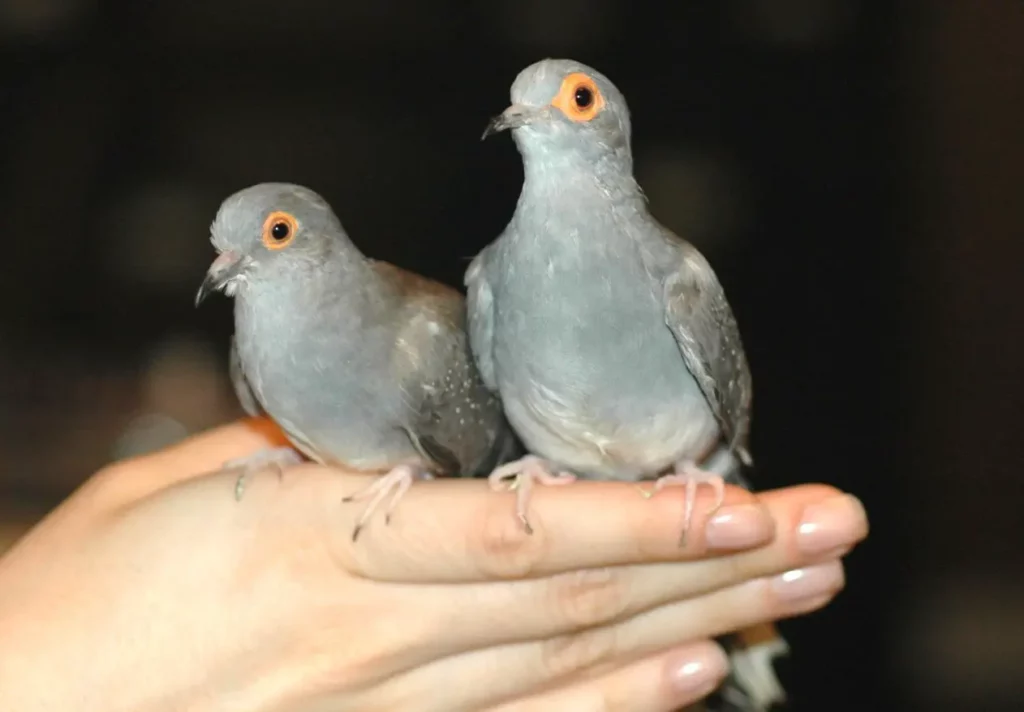
Diamond doves are small, gentle, and relatively low-maintenance birds that enjoy observing their environment. They don’t require much handling and are content with occasional interactions. Their diet should consist of seeds, greens, and small amounts of fresh fruits.
Diamond doves are quiet birds that make ideal apartment pets. A spacious cage with horizontal bars for perching and hopping is essential for their well-being.
Key Factors to Consider When Choosing a Bird for Apartment Living
1. Noise levels
One of the primary concerns for apartment dwellers is the noise level produced by pet birds. While some species are relatively quiet, others can be quite loud, potentially causing disturbances to neighbors.
When selecting a bird breed, make sure to research their typical vocalizations and noise levels, opting for quieter species to maintain a harmonious living situation.
2. Space requirements
Another essential factor to consider is the space required for your pet bird. Different bird species have varying needs when it comes to cage size and room for exercise. In an apartment setting, it’s crucial to choose a bird that will comfortably fit within the available space.
Be sure to measure the area where you plan to place the cage and consider the room needed for additional equipment, such as perches and toys.
3. Maintenance and care
Each bird species has unique care requirements, including diet, exercise, grooming, and healthcare. Before selecting a pet bird, research the specific needs of each breed and ensure that you can accommodate their daily care routine.
Keep in mind that some birds may be more demanding in terms of time commitment and maintenance, while others are relatively low-maintenance and easier to care for.
4. Social needs
Birds are social creatures, and their social needs play a significant role in their overall well-being. Some bird species are more independent, while others require frequent interaction and socialization to thrive. Consider your daily schedule and the amount of time you can dedicate to interacting with your pet bird.
Choosing a breed that matches your availability and desire for companionship will contribute to a happy and healthy pet-owner relationship.
Tips for Creating a Comfortable and Safe Environment for Your Apartment Bird
Choosing the right cage
Selecting the appropriate cage is crucial for your pet bird’s happiness and well-being. Ensure that the cage is large enough for your bird to stretch its wings, climb, and explore comfortably. Look for cages with horizontal bars, as they provide an excellent opportunity for your bird to climb and perch.
Also, consider the spacing between the bars to prevent any chance of injury or escape.
Providing mental stimulation and toys
Mental stimulation is essential for keeping your pet bird happy and healthy. Provide a variety of toys, such as puzzles, foraging toys, and chewable items to keep your bird engaged and entertained. Regularly rotate the toys to maintain their interest and prevent boredom.
Additionally, incorporate perches of different textures and sizes to encourage healthy foot exercise and prevent foot problems.
Ensuring proper nutrition and healthcare
A balanced diet is vital for your pet bird’s overall health. Research the specific dietary needs of your bird species and provide them with a mix of pellets, seeds, and fresh fruits and vegetables. Offer clean water daily and clean their food and water dishes regularly.
Keep an eye on your bird’s health and consult with an avian veterinarian for regular check-ups and any concerns that may arise.
Balancing social time and independence
Recognize and respect your bird’s social needs and independence. While some birds enjoy frequent interactions, others are more content with occasional handling. Dedicate time to socializing with your pet bird and observe their body language to understand their comfort level.
Additionally, allow them some alone time to explore their surroundings and toys independently. This balance will help foster a strong bond between you and your pet bird while maintaining their well-being.
Frequently Asked Questions
How can I soundproof my apartment for my pet bird?
To soundproof your apartment for your pet bird, consider using weatherstripping on doors and windows, adding curtains or blinds, placing rugs on the floor, and investing in sound-absorbing panels.
Are there specific regulations for keeping pet birds in apartments?
Regulations for keeping pet birds in apartments vary depending on your location and the specific rules of your building or rental agreement. Be sure to check with your landlord or building management before bringing a pet bird into your apartment.
What’s the average lifespan of small pet birds?
The average lifespan of small pet birds varies by species, ranging from 5 to 20 years or more. Proper care, nutrition, and healthcare can contribute to a longer lifespan.
How do I manage the mess created by pet birds in my apartment?
To manage the mess created by pet birds, place a mat under the cage, use cage liners or paper towels for easy clean-up, and invest in a small handheld vacuum for quick and efficient cleaning. Regularly clean the cage and surrounding areas to maintain a tidy environment.
Conclusion
Bringing a small pet bird into your apartment can be a delightful and fulfilling experience. These feathered companions can bring joy, entertainment, and companionship to your life, all while comfortably adapting to an apartment setting.
By choosing the right bird breed and providing a safe and comfortable environment, you’ll ensure a happy life for both you and your new avian friend.
Before deciding on a particular bird breed, take the time to research and consider each species’ unique traits, care requirements, and suitability for apartment living. Reflect on your lifestyle, the available space, and the amount of time and attention you can provide.
Making an informed decision will result in a harmonious relationship between you and your pet bird, and ultimately create a loving and nurturing home for your new companion.


